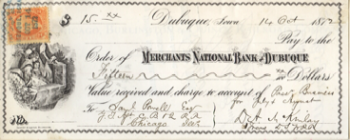Encyclopedia Dubuque
"Encyclopedia Dubuque is the online authority for all things Dubuque, written by the people who know the city best.”
Marshall Cohen—researcher and producer, CNN
Affiliated with the Local History Network of the State Historical Society of Iowa, and the Iowa Museum Association.
MERCHANTS' NATIONAL BANK
MERCHANTS' NATIONAL BANK. Located at Main and 5th STREETS, the bank opened for business on May 1, 1865. F. H. W. Sheffield was the president and Richard A. BABBAGE cashier. The 1873-74 Dubuque City Directory listed 96 Main as the business address.
Babbage came to Dubuque in 1856 and sold real estate before opening a private bank that prospered. In 1865 he was bought out and made cashier of Merchants' National whose officers included such prominent Dubuque residents as William Boyd ALLISON, Henry L. STOUT, and John T. HANCOCK.
On September 26, 1873 customers arriving at the bank was shocked to find a small sign with one word--Closed. The decision to close the bank had occurred the night before at a meeting of the directors. The previous day word from Chicago was received that several Dubuque banks would suspend operations because of tight money in the East. Depositors in the Merchants Bank, not knowing which banks might be involved, rushed to withdrawn their deposits. At the end of the day, the bank officials found themselves without enough money to open the following day. (1)
On Saturday, Caleb H. BOOTH was appointed custodian of the bank's assets. The following Wednesday, a U. S. bank examiner announced that the bank was in good financial condition. Further investigation, however, found that the bank's books had been altered with false entries totaling $200,000. Babbage and Sheffield were accused to taking the missing funds. (2)
The bank failed and depositors lost everything. It was finally determined that Babbage had taken $267,289 and Sheffield $62,188. Babbage fled at night in a closed carriage to Maquoketa where he boarded a train for Portland, Maine. He later sailed to South America and then moved to London where he worked as a commission merchant. Sheffield moved to the eastern United States working in a company manufacturing wagons. (3) Their private property including buggies, sleighs, harness, blankets, and horses were sold at auction.
William E. WELLINGTON was appointed to settle the bank's affairs and later bought its assets.
---
Source:
1. "1873 Bank Closing Panicked City," Telegraph Herald, March 6, 1960, Dubuque News, p. 1
2. Ibid.
3. Ibid.
"Butchers, Bankers, and Cabinet Makers," Booklet accompanying the Robert Reding exhibit at the OLD JAIL 2007-2010


